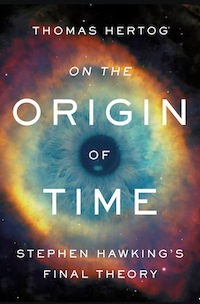On the Origin of Time: Stephen Hawking's Final Theory
Our top-down perspective reverses the hierarchy between laws and reality in physics. It leads to a new philosophy of physics that rejects the idea that the universe is a machine governed by unconditional laws and replaces it with the view that the universe is a kind of self-organizing entity, in which all sorts of emergent patterns appear, the most general of which we call the laws of physics. One might say that in top-down cosmology, the laws serve the universe, not the universe the laws. The theory holds that if there is an answer to the great question of existence, it is to be found within this world, not in a structure of principles outside it.
Solid and well-written book detailing the history and evolution of the ideas that built up to what the author calls Stephen Hawking’s final theory.
I was surprised at how much of the book was dedicated to the history of the ideas that Hawking built his theories upon and how little of the book was actually dedicated to the holographic principle. It really left me wanting for more on the latter! In the end I didn’t end up minding it too much since this history set the scene for Hawking’s perspective and approach to problem solving. I also really enjoyed learning about the philosophical approaches of tackling cosmology from the bottom up versus from the top down.
A great book for cosmology enthusiasts and eminently beginner-friendly.
